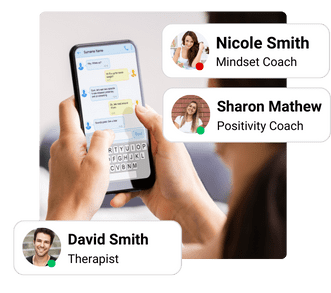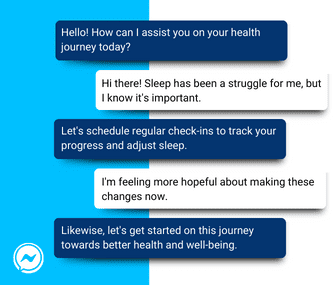
Free Bipolar Disorder Counseling
Be heard by listeners and chat with others who understand your Bipolar issues. You may also talk to licensed counselors.
1000+ Listeners across the globe help you deal with Bipolar Disorder
We live in a world where, we are surrounded by people, but still feel lonely. Being heard is an important part of being human. Thanks to thousands of volunteer listeners stepping up to lend a friendly ear, MindMantra is happy to say, “We’re here for you!”. It’s 100% Free.
Whether you’re navigating bipolar issues or other personal struggles, our listeners are keen to help. These listeners may be psychology interns, therapists, or common people who are just there to help you deal with this rough patch.
You may also choose to talk to a licensed therapist at a very affordable cost.
This is what the symptoms of Bipolar Disorder can look like…
- Periods of elevated mood, increased energy, and extreme activity levels.
- Periods of persistent sadness, lack of energy, and feelings of hopelessness.
- Feeling unusually energetic or agitated.
- Needing less sleep than usual during a manic phase.
- Talking fast, jumping between topics, or feeling pressured to keep talking.
- Having many thoughts racing through the mind.
- Engaging in risky behaviors like excessive spending, reckless driving
- Finding it hard to focus or make decisions.
- Losing interest in activities once enjoyed.
- Feeling overly guilty or worthless
- Experiencing persistent tiredness or lack of energy.
- Having thoughts of death or suicide


Why talk to a Listener?
- Listeners at My MindMantra are trained to listen actively and empathetically, offering emotional support and validation without judgment.
- Discussing your thoughts and emotions with our Listeners can help you gain clarity and perspective on issues such as anxiety, depression, stress, insomnia and other such issues.
- Through conversations with Listeners, you may discover your strengths and develop strategies to navigate difficult situations more effectively.
Read how people feel after talking to us…

Renewed Stability
My MindMantra guided me through bipolar challenges, restoring balance. Grateful for their compassionate counseling and transformative support.

Empowered Journey
Life after counseling at My MindMantra is brighter. They empowered me with coping tools, fostering resilience post-bipolar struggles.

Compassionate Guidance
Exceptional bipolar counseling at My MindMantra. Compassionate professionals provided insightful guidance, fostering healing and emotional well-being.

Transformative Healing
My MindMantra’s counseling transformed my bipolar journey. A healing experience that equipped me with strength, hope, and effective coping strategies.
How it works?

Signup
Answer a few questions, and we’ll match you with a Mantra Listener that’s right for you.

Get Matched
Connect with a listener at your convenience for 1:1 virtual chat, audio, or video sessions.

Enroll with MantraCare
98% of members at MantraCare rate sessions with their Listener as amazing or life-changing.
Frequently Asked Questions
What can listeners do to help with bipolar disorder?
Listeners provide a safe space for individuals to express their feelings and thoughts. They use active listening techniques, empathy, and non-judgmental support to help individuals navigate their anxiety.
How do listeners create a supportive environment for those with bipolar disorder?
They create a supportive environment by offering empathy, understanding, and validation. They often use calming language, encourage self-expression, and provide reassurance.
Do listeners give advice or solutions?
Listeners typically avoid giving direct advice or solutions. Instead, they encourage individuals to explore their thoughts and feelings, aiding in finding their own solutions.
Is there a limit to what topics can be discussed with listeners?
Listeners are open to discussing various topics related to bipolar disorder, stress, or personal challenges. However, there might be limitations, and it’s essential to adhere to the guidelines of the service.
Do listeners follow any specific approach or methodology in their support?
Listeners typically utilize active listening techniques, empathy, and non-directive approaches. They avoid judgment and aim to help individuals explore their feelings and thoughts without imposing their own beliefs or methods.